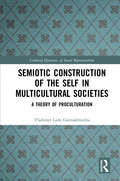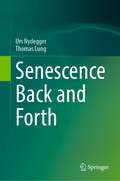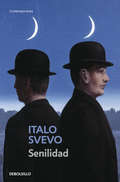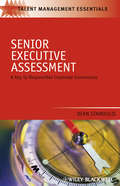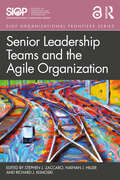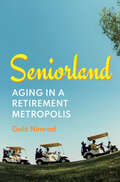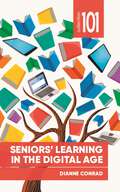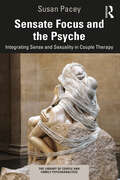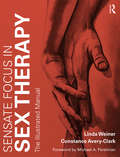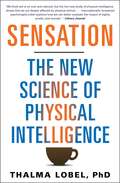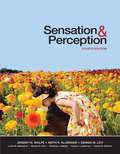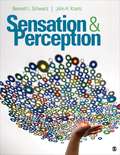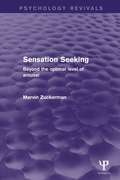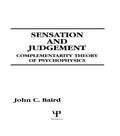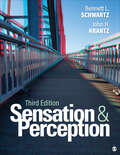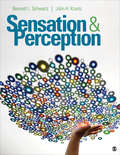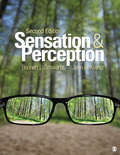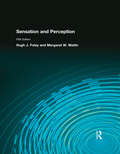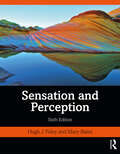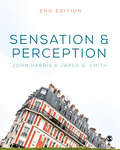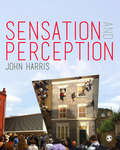- Table View
- List View
Semiotic Construction of the Self in Multicultural Societies: A Theory of Proculturation (Cultural Dynamics of Social Representation)
by Vladimer Lado GamsakhurdiaSemiotic Construction of the Self in Multicultural Societies elaborates on a holistic theory on the self, by means of integrating social representation theory, dialogical self theory and particular ideas from Vygotskyan developmental psychology in one framework. This book sends a humanistic message by indicating the power of inexhaustible human imagination that empowers individuals to strive for knowing the unknown, checking limits of their abilities and challenging (distancing) and at the same time, affectively and semiotically engaging (undistancing and recreating) their heritage cultures. It provides theoretical elaborations and innovations through the example of the case study of Georgian society and particular cases of proculturation. The theoretical and empirical explorations of proculturation experiences allow ways of tracing the rebuilding of the bridges between psychological and anthropological sciences, paving a path towards transdisciplinary approaches. This book will be of great interest to academics, researchers and post-graduate students in the fields of social psychology, semiotics and multicultural studies.
Senescence Back and Forth
by Urs Nydegger Thomas LungThis book is about lifelong ageing of humans. The basic biochemical and genetic mechanisms remain ill known, and differ among individuals. The book starts out to explore the plant and animal kingdoms to answer questions human ageing needs for understanding. First, we come to scrutinize time running out and what ‘normal’ means with impacts on the genome and on protein half- lives and function. Ageing goes beyond biochemical skid treated by geroprotector drugs, including biosimilars; albeit early diagnosis with standard medical laboratory assays, here addressed, sheds light with focus on basic research. Modern tools, including machine learning, and DNA technology, e.g. genomics, have already provided for unanticipated insights. The chapters then turn around senescence of the entire organism based on variable ageing of single organs embedded in neuronal networks . Psychological stress factors, dementia opposed to vigilance, and distinction of ageing from overt disease are contrasting in humans and are opposed in the book. Senescence, seen as a one way track may be reverted into rejuvenation, made possible by insights into immunosenescence and genomic approaches. Risk management in health insurance finds important clues in this book. The topics addressed between the book covers help to understand the trend to the ever- prolonging life expectancy beyond the centenarian age group; nursing care takers and pharmaceutical industry are invited to understand what’ is going on in senior people to make their geriatric population remain fit or become frail.
Senilidad
by Italo SvevoNo hace mucho tiempo, Emilio Brentani era un joven y prometedor autor. Ahora es un agente de seguros en el rápido sendero hacia los cuarenta con una ilusión que parece detenerle en su carrera: se ha enamorado de la joven y hermosa Angiolina. Llena de humanidad y humor, de introspección psicológica y de una elegante simplicidad de estilo, Senilidad es un brillante estudio del amor sin esperanzas y de la indecisión. «También yo, ahora que sé lo que es la vejez de verdad, me sonrío a veces de haberle dedicado un exceso de amor.» Italo Svevo
Senior Executive Assessment
by Dean StamoulisSenior Executive Assessment is a concise and practical guide that demystifies assessment that is conducted at the senior-executive level. Defines Senior Executive Assessment, describes its benefits, and explains how it differs from assessment at lower levels Discusses how significant shifts in markets and business models can require a change in the characteristics needed in senior executives Provides a practical model with suggestions for assessing senior executives Offers guidelines for determining what assessment methods to use in an organization Examines practical considerations in how to choose professionals to conduct senior executive assessment
Senior Leadership Teams and the Agile Organization (SIOP Organizational Frontiers Series)
by Richard J. Klimoski Stephen J. Zaccaro Nathan J. HillerSenior Leadership Teams and the Agile Organization builds on existing knowledge in the leadership, teams, and strategic management literatures to examine and explore how senior leadership teams drive the dynamic capabilities of organizations. Organizational agility is a key dimension of organizational performance. This volume focuses on senior leadership team processes and attributes that facilitate organizational agility and the organization’s capacity to perform and rapidly pivot in response to shifting strategic demands. Chapters summarize the current state of knowledge, examine past research and theory, define research and theoretical gaps, and consider how to address these gaps. In so doing, they offer an understanding of how senior leadership teams drive and enable organizational activity. The book is essential reading for researchers and professionals looking to understand the intersection of leadership, team dynamics, organizational psychology, organizational psychology, and strategic management, particularly in relation to organizational agility and the senior leadership team.
Seniorland: Aging in a Retirement Metropolis
by Galit NimrodDespite the abundance of retirement communities in the US, none compare to The Villages in Central Florida. Home to nearly 150,000 residents and spanning an area larger than Manhattan, it is the world's largest retirement community and the only one that can be considered a city for older adults. Based on in-depth interviews with 40 residents and two months of participant observations, this captivating and insightful book delves into the aging experience in The Villages. It explores why people move there, their perceptions of its rapid growth, changes in their daily activities upon moving and over time, social involvement and leisure constraints, and their sense of identity and community. In doing so, this book unveils how The Villages' unique characteristics profoundly impact residents' well-being and offers a glance into the future of old age.
Seniors’ Learning in the Digital Age (101 Collection)
by Dianne ConradHow are older learners faring in today’s digital society? Are they being excluded or left behind? The author explores this question and investigates strategies needed to assist older learners who want to continue learning into their golden years. Canada’s demographics are shifting, with more seniors living longer and leading more productive lives, notably through their participation in education.Incorporating adult education theory and practice with gerontological statistics and literature, the author considers the situations of older learners, who are faced with both barriers and opportunities. Technology should not be an obstacle to older learners; when potential opportunities arise—and with assistance from family and friends—education can help set older learners on a fulfilling path that enhances their lives.
Sensate Focus and the Psyche: Integrating Sense and Sexuality in Couple Therapy (The Library of Couple and Family Psychoanalysis)
by Susan PaceySensate Focus and the Psyche explores in depth both psychoanalytic and psychosexual perspectives of sensate focus, a programme of touching exercises for couples with sexual problems, and in so doing provides an original, integrated model for understanding the conscious and unconscious impact of this tactile intervention on couples in treatment. Susan Pacey reviews the historical relationship between psychoanalysis and sex therapy and the splitting of mind, body and relationship since Freud. She illustrates how the tactile intervention can help repair the early life impingements on partners’ individual development that mobilise anxieties about sexuality and shame in adulthood. Case studies illustrate how sensate focus can help conceptualise unconscious embodied memories, repair shame, encourage Winnicottian play, work through transitional phenomena and develop psychological space, establishing a platform for the healthy expression of adult sexuality. Pacey discusses how sexual desire and aggression are inextricably linked in the human psyche, proposing that sensate focus can help enable positive aggression necessary for sex and reduce the potential for partners’ anxieties about their psychological separateness. Lastly, she proposes judicious use of this powerful, tactile intervention and highlights contraindications. Sensate Focus and the Psyche will be essential reading for all psychotherapists who work with individuals, couples and families.
Sensate Focus in Sex Therapy: The Illustrated Manual
by Linda Weiner Constance Avery-ClarkSensate Focus in Sex Therapy: The Illustrated Manual is an illustrated manual that provides health professionals with specific information on the use of the structured touching opportunities used regularly by Sexologists to address their clients’ sexual difficulties (Sensate Focus 1) and enhance intimate relationships (Sensate Focus 2). This book is the only one to: vividly describe and illustrate the specific steps of, activities involved in, and positions associated with Sensate Focus; emphasize the purpose of Sensate Focus as a mindfulness-based practice; and distinguish between the purposes of Sensate Focus 1 and Sensate Focus 2. Through the use of artful drawings and descriptive text, this manual engages mental health and medical professionals and their clients by appealing to both the visual and the analytical. It discusses how modifications to Sensate Focus can be applied to diverse populations, such as LGBTQ clients, the elderly, the disabled, trauma survivors, and those with challenges such as Autism Spectrum, anxiety, and depression. The book also offers suggestions for dealing with common client difficulties such as avoidance, confusion, and goal directed attitudes. This comprehensive approach to Sensate Focus will remind readers of the beauty and power of touch while offering suggestions for moving from avoidance to sensory transcendence.
Sensation
by Thalma LobelLike the revolutionary bestsellers Predictably Irrational and Emotional Intelligence, Sensation is an exciting, completely new view of human behavior--a new psychology of physical intelligence (or embodied cognition)--that explains how the body unconsciously affects our everyday decisions and choices, written by one of the world's leading psychologists.From colors and temperatures to heavy objects and tall people, a whole symphony of external stimuli exerts a constant influence on the way your mind works. Yet these effects have been hidden from you--until now. Drawing on her own work as well as from research across the globe, Dr. Thalma Lobel reveals how shockingly susceptible we are to sensory input from the world around us. An aggressive negotiator can be completely disarmed by holding a warm cup of tea or sitting in a soft chair. Clean smells promote moral behavior, but people are more likely to cheat on a test right after having taken a shower. Red-colored type causes us to fail exams, but red dresses make women sexier and teams wearing red jerseys win more games. We take questionnaires attached to heavy clipboards more seriously and believe people who like sweets to be nicer. Ultimately, the book's message is startling: Though we claim ownership of our decisions, judgments, and values, they derive as much from our outside environment as from inside our minds. Now, Sensation empowers you to evaluate those outside forces in order to make better decisions in every facet of your personal and professional lives.
Sensation & Perception (Fourth Edition)
by Jeremy M. Wolfe Keith R. Kluender Dennis M. Levi Linda M. Bartoshuk Rachel S. Herz Roberta Klatzky Susan J. Lederman Daniel M. MerfeldSensation & Perception is written by experts in each of the five senses who have a passion and enthusiasm for conveying the excitement of this field to students. Each of the 15 chapters of this book tells a coherent and interesting story that gives the reader enough background and exposure to enough current research to understand why these topics are interesting and how they might be further investigated and understood.
Sensation And Perception
by Bennett L. Lowell Schwartz John H. Howell KrantzSensation and Perception, by Bennett L. Schwartz and John H. Krantz, is a cutting-edge, easy-to-understand account of the modern sensation and perception field presented from both a cognitive and neurocognitive perspective. The book's rich examples and applications to everyday life emphasize such high-interest topics as music, clinical applications, neuropsychology, and animal perception systems.
Sensation Seeking: Beyond the Optimal Level of Arousal (Psychology Revivals)
by Marvin ZuckermanOriginally published in 1979, this title represents a summary of 17 years of research centring around the Sensation Seeking Scale (SSS) and the theory from which the test was derived. Now an integral part of personality testing, including adaptations for use with children, this reissue is a chance to see where it all began.
Sensation and Judgment: Complementarity Theory of Psychophysics (Scientific Psychology Series)
by John C. BairdPsychophysical theory exists in two distinct forms -- one ascribes the explanation of phenomena and empirical laws to sensory processes. Context effects arising through the use of particular methods are an unwanted nuisance whose influence must be eliminated so that one isolates the "true" sensory scale. The other considers psychophysics only in terms of cognitive variables such as the judgment strategies induced by instructions and response biases. Sensory factors play a minor role in cognitive approaches. This work admits the validity of both forms of theory by arguing that the same empirical phenomena should be conceptualized in two alternative, apparently contradictory, ways. This acceptance of opposites is necessary because some empirical phenomena are best explained in terms of sensory processes, while others are best ascribed to central causes. The complementarity theory stresses the "mutually completing" nature of two distinct models. The first assigns importance to populations of sensory neurons acting in the aggregate and is formulated to deal with sensory effects. The second assigns importance to judgment uncertainty and to the subject strategies induced by experimental procedures. This model is formulated to explain context effects. Throughout the text, the exposition is interlaced with mathematics, graphs, and computer simulations designed to reveal the complementary nature of psychophysical explanations.
Sensation and Perception
by Bennett L. Schwartz John H. KrantzSensation and Perception is a cutting edge and highly readable account of modern sensation and perception from both a cognitive and neurocognitive perspective. Written in an accessible and engaging manner, authors Bennett L. Schwartz and John H. Krantz offer readers the most relevant topics in the field of sensation and perception. Rich in examples and applications to everyday life, the text includes an emphasis on areas of interest to students, namely, music, clinical applications, neuropsychology, and interesting animal perception systems. Updates to the Third Edition include revised chapters throughout, new science, and interactive video links. This title is accompanied by a complete teaching and learning package. Learning Platform / Courseware Sage Vantage is an intuitive learning platform that integrates quality Sage textbook content with assignable multimedia activities and auto-graded assessments to drive student engagement and ensure accountability. Unparalleled in its ease of use and built for dynamic teaching and learning, Vantage offers customizable LMS integration and best-in-class support. It’s a learning platform you, and your students, will actually love. . Assignable Video with Assessment Assignable video (available in Sage Vantage) is tied to learning objectives and curated exclusively for this text to bring concepts to life. LMS Cartridge: Import this title’s instructor resources into your school’s learning management system (LMS) and save time. Don’t use an LMS? You can still access all of the same online resources for this title via the password-protected Instructor Resource Site.
Sensation and Perception
by Bennett L. Schwartz John H. KrantzSensation and Perception is a cutting edge and highly readable account of modern sensation and perception from both a cognitive and neurocognitive perspective. Written in an accessible and engaging manner, authors Bennett L. Schwartz and John H. Krantz offer readers the most relevant topics in the field of sensation and perception. Rich in examples and applications to everyday life, the text includes an emphasis on areas of interest to students, namely, music, clinical applications, neuropsychology, and interesting animal perception systems. Updates to the Third Edition include revised chapters throughout, new science, and interactive video links. This title is accompanied by a complete teaching and learning package. Learning Platform / Courseware Sage Vantage is an intuitive learning platform that integrates quality Sage textbook content with assignable multimedia activities and auto-graded assessments to drive student engagement and ensure accountability. Unparalleled in its ease of use and built for dynamic teaching and learning, Vantage offers customizable LMS integration and best-in-class support. It’s a learning platform you, and your students, will actually love. . Assignable Video with Assessment Assignable video (available in Sage Vantage) is tied to learning objectives and curated exclusively for this text to bring concepts to life. LMS Cartridge: Import this title’s instructor resources into your school’s learning management system (LMS) and save time. Don’t use an LMS? You can still access all of the same online resources for this title via the password-protected Instructor Resource Site.
Sensation and Perception
by Dr Bennett L. Schwartz John H. KrantzSensation and Perception, by Bennett L. Schwartz and John H. Krantz, is a cutting-edge, easy-to-understand account of the modern sensation and perception field presented from both a cognitive and neurocognitive perspective. The book’s rich examples and applications to everyday life emphasize such high-interest topics as music, clinical applications, neuropsychology, and animal perception systems. Clear, illustrative diagrams and figures along with an extensive collection of online activities allow readers to interact with the phenomena covered in the text, perform experiments, and gain a deeper understanding of key course concepts.
Sensation and Perception
by Dr Bennett L. Schwartz John H. KrantzSensation and Perception, by Bennett L. Schwartz and John H. Krantz, is a cutting-edge, easy-to-understand account of the modern sensation and perception field presented from both a cognitive and neurocognitive perspective. The book’s rich examples and applications to everyday life emphasize such high-interest topics as music, clinical applications, neuropsychology, and animal perception systems. Clear, illustrative diagrams and figures along with an extensive collection of online activities allow readers to interact with the phenomena covered in the text, perform experiments, and gain a deeper understanding of key course concepts.
Sensation and Perception
by Dr Bennett L. Schwartz John H. KrantzThe highly accessible Sensation and Perception presents a current and accurate account of modern sensation and perception from both a cognitive and neurocognitive perspective. To show students the relevance of the material to their everyday lives and future careers, authors Bennett L. Schwartz and John H. Krantz connect concepts to real-world applications, such as driving cars, playing sports, and evaluating risk in the military. Interactive Sensation Laboratory Exercises (ISLE) provide simulations of experiments and neurological processes to engage readers with the phenomena covered in the text and give them a deeper understanding of key concepts. The Second Edition includes a revamped version of the In Depth feature from the previous edition in new Exploration sections that invite readers to learn more about exciting developments in the field. Additionally, new Ponder Further sections prompt students to practice their critical thinking skills with chapter topics.
Sensation and Perception
by Dr Bennett L. Schwartz John H. KrantzThe highly accessible Sensation and Perception presents a current and accurate account of modern sensation and perception from both a cognitive and neurocognitive perspective. To show students the relevance of the material to their everyday lives and future careers, authors Bennett L. Schwartz and John H. Krantz connect concepts to real-world applications, such as driving cars, playing sports, and evaluating risk in the military. Interactive Sensation Laboratory Exercises (ISLE) provide simulations of experiments and neurological processes to engage readers with the phenomena covered in the text and give them a deeper understanding of key concepts. The Second Edition includes a revamped version of the In Depth feature from the previous edition in new Exploration sections that invite readers to learn more about exciting developments in the field. Additionally, new Ponder Further sections prompt students to practice their critical thinking skills with chapter topics.
Sensation and Perception
by Margaret Matlin Hugh FoleySensation and Perception, Fifth Edition maintains the standard of clarity and coverage set in earlier editions, which make the technical scientific information accessible to a wide range of students. The authors have received national awards for their teaching and are fully responsible for the content and organization of the text. As a result, it features strong pedagogy, abundant student-friendly examples, and an engaging conversational style.
Sensation and Perception
by Hugh J. Foley Mary BatesMaintaining the strong pedagogy, abundant student-friendly examples, and engaging conversational style of the previous editions, the sixth edition of this introductory textbook makes technical scientific information accessible to those who are beginning to specialize in cognitive psychology. Sensation and Perception, Sixth Edition is newly available in a more affordable paperback version, making it ideal for undergraduate students. In this new edition Bates has built on Foley and Matlin’s core text to add updates focusing on multisensory integration, neural plasticity, and cognitive neuroscience, as well as real-world examples and practical applications of psychological phenomena. The sixth edition retains the clear organization of previous versions, covering a wide range of core topics, from skin senses such as touch to chemical senses such as taste and smell, to our complex visual and auditory sensory systems. This book is essential reading for undergraduates and postgraduates studying courses on sensation and perception.
Sensation and Perception
by Jared Smith John HarrisIs the human eye like a camera? What makes your ears ‘pop’ on a plane? Why did women in the Middle Ages put belladonna into their eyes? This fully updated 2nd edition of Sensation and Perception is an accessible introduction to the field of perception. It covers in detail the perceptual processes related to vision and hearing, taste and smell, touch and pain, as well as the vestibular and proprioceptive systems. From seeing in colour to pathologies of perception, and from recognising faces to research methods, this textbook is essential reading for any student of perception. New material includes: · ‘Applications’ features connect key content to real-life contexts · Thinking Critically feature pushes students beyond the basics · End-of-chapter essay questions · An entirely new chapter on Action & Perception John Harris is Emeritus Professor of Psychology at the University of Reading Jared Smith is Senior Research Fellow at the Population Health Research Institute of St George’s, University of London
Sensation and Perception
by Jared Smith John HarrisIs the human eye like a camera? What makes your ears ‘pop’ on a plane? Why did women in the Middle Ages put belladonna into their eyes? This fully updated 2nd edition of Sensation and Perception is an accessible introduction to the field of perception. It covers in detail the perceptual processes related to vision and hearing, taste and smell, touch and pain, as well as the vestibular and proprioceptive systems. From seeing in colour to pathologies of perception, and from recognising faces to research methods, this textbook is essential reading for any student of perception. New material includes: · ‘Applications’ features connect key content to real-life contexts · Thinking Critically feature pushes students beyond the basics · End-of-chapter essay questions · An entirely new chapter on Action & Perception John Harris is Emeritus Professor of Psychology at the University of Reading Jared Smith is Senior Research Fellow at the Population Health Research Institute of St George’s, University of London
Sensation and Perception
by John HarrisSensation and Perception covers in detail the perceptual processes related to vision and hearing, taste and smell, touch and pain as well as the vestibular and proprioceptive systems. Individual chapters cover separate topics including the fast-developing areas of perception of emotions and attractiveness and recognition of faces, plus newer topics not seen regularly in other textbooks, for example changes in perception throughout the lifespan and pathologies of perception.<P><P> Key features:<P> * Chapters begin with summaries of key topics and questions to aid learning <P> * Includes key points, spotlights on research, and 'Thinking about Research' sections, designed to encourage students to design their own studies <P> * Chapters close with 'Test Yourself' questions, a review of key terms and annotated further readings <P> A Companion Website offers additional resources for lecturers and students available on publication at: www.sagepub.co.uk/harris
